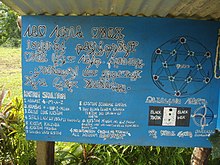Bislama
[5] During the period of "blackbirding" in the 1870s and 1880s, hundreds of thousands of Pacific islanders (many of them from the New Hebrides – now the Vanuatu archipelago) were taken as indentured labourers, often kidnapped, and forced to work on plantations, mainly in Queensland, Australia, and Fiji.[7] This early plantation pidgin is the origin not only of Bislama, but also of Tok Pisin in Papua New Guinea, and Pijin of the Solomon Islands; though not of Torres Strait Creole in the north of Australia.This creole started spreading throughout the Vanuatu archipelago at the turn of the 20th century, as former blackbirds and their descendants began to return to their native islands.The names biche-la-mar and Sandalwood English came to be associated with the kind of pidgin that came to be used by the local laborers between themselves, as well as their English-speaking overseers.[12] Robert Louis Stevenson wrote in an account of his travels through the Pacific in 1888 and 1889, "the natives themselves have often scraped up a little English ... or an efficient pidgin, what is called to the westward Beach-la-Mar.", one of his "South Sea Tales", there is repeated a reference to "a bastard lingo called bech-de-mer", and much of the story's dialogue is conducted in it.It has distinct letters for NG and NGG, but otherwise corresponds closely to the Latin alphabet above, though capitals are seldom used, punctuation differs, there are digits for higher numbers and logograms for commonly traded commodities such as pig tusks.Just like of in English, it is one of the most widely used and versatile words in the language, and can indicate possession, country of origin, defining characteristics, intention, and others.Examples of transitive verbs which exceptionally don't take this suffix include: kakae 'eat, bite'; trink 'drink'; save 'know'; se 'say'.They feature four grammatical numbers (singular, dual, trial and plural) and also encode the clusivity distinction: 1st person non-singular pronouns (equivalent of English we) are described as inclusive if they include the addressee (i.e. {you + I}, {you + I + others}), but exclusive otherwise (i.e. {I + other people}).The predicate marker i – a particle which is placed before the verbal phrase of a sentence – is sometimes merged with the third person pronoun, giving the words hemi and emi, respectively, in singular, and oli in plural.[19] "Tufala i stap yet long Betlehem, nao i kam kasem stret taem blong Meri i bonem pikinini.

sea cucumber (food)VanuatuLanguage familyEnglish CreoleMelanesian PidginWriting systemAvoiuliISO 639-1ISO 639-2ISO 639-3GlottologLinguasphereEnglish-based creole languageni-VanuatuPort VilaLuganvilleYumi, Yumi, Yumilanguages of VanuatumorphosyntaxOceanicblackbirdingNew HebridesQueensland, AustraliapidginTok PisinPapua New GuineaSolomon IslandsTorres Strait Creole113 languageslingua francasea cucumbersandalwoodRobert Louis StevensonJack LondonSouth Sea TalesboustrophedonLabialized consonantsPentecostlogogramstransitive verbsvowel harmonytense, aspect and moodpersonal pronounsclusivitydeclinepredicateverbal phraseprogressivepast tenseperfectiveirrealisconditional sentencesEnglishpredicativeLangues et civilisations à tradition oraleCrowley, TerryFrançois, AlexandreTryon, Darrell T.EthnologueWikipediaWayback MachineAustralian National UniversityParadisecFrenchSouthern OceanicPolynesianNorth VanuatuTorres–BanksLehaliLemerigLo-TogaLöyöpMwerlapMwesenMwotlapVera'aVurësPenamaNorth AmbrymBaetoraFanbakSungwadagaSungwadiaEspiritu SantoAmblongButmasMerei-TialeNarangoNethalpNokukuPiamatsinaPolonombaukTamamboTambotaloTangoaTasmateToksikiTolomakoTutubaValpeiVunapuWailapaDaruruRetlaturFarnantoFanafoCentral VanuatuNorth EfateNafsanEfateseLelepaMakuraDaakakaDalkalaenLonwolwolPaamesePort VatoSoutheast AmbrymBiereboBieriaMalakulaAveteianBig NambasBotovroBurmbarBwenelang